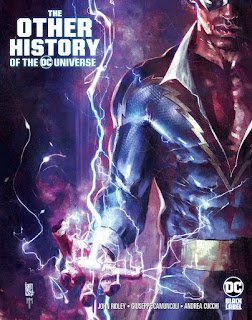DC announced The Other History of the DC Universe way back in early 2018. I don't know what caused such a significant delay, but the first of five issues finally came out at the end of November. DC billed the story thus: "This five-issue series reframes iconic moments from DC history, exploring them through the eyes of DC Super Heroes representing traditionally disenfranchised groups." Between that and the series being written by John Ridley (who worked on The American Way which I quite liked) and just hoping to see how the DC Universe looks these days after who-knows-how-many-reboots, I was intrigued to pick this up.
Let me throw out a couple caveats to begin. First, I never read the original History of the DC Universe which is the namesake of this book, nor have I read the "History of the DCU" backup features from 52. I don't know how much of this, if any, is directly based on those (versus the original stories they puport to summarize). Second, I haven't read any DC books with any regularity since maybe 2007, so I'm not exactly up to speed on what's considered canon or not these days.
Book One here is entitled "1972-1995: Jefferson Pierce." The issue covers Pierce's origins from the death of his father and his Olympic wins through his developing powers and becoming Black Lightning before finally ending shortly after the disbanding of The Outsiders. It's written in a decidedly autobiographical manner and reads rather like an illustrated memoir. Formally, I'd be hard-pressed to call it a comic book per se. Even the History of the Marvel Universe (which I reviewed earlier this year) is more of a comic than this is. The prose-ness of Pierce's autobiography is further emphasized by the entire book being set in a standard san serif font. (I'm far enough removed from my graphic design days that I don't recognize it offhand, other than being able to say it's not Arial or Helvetica.)
The approach to chronology was interesting here. By limiting the story's timeframe from 1972 to 1995, they could reasonably keep it plausible that it would cover an adult's life before they grew too old to put on spandex and go out superheroing. I haven't actually checked, but I believe the timeline of the story follows pretty closely with the character's publication history. However, within that same timeframe, they've also included the debuts of Superman, Batman, Wonder Woman, and the rest of the DC pantheon. Even John Stewart, whose comic book debut was conceivably within the book's timeframe, had his origin apparently pushed back a few years... although not as far back as the creation of the Justice League, which was evidently pushed back even farther than Stewart's first appearance. All of which is to say not that this is a bad story or a bad presentation, but it's not a "history" in the same way History of the Marvel Universe or (to the best of my understanding) History of the DC Universe were. It's not trying to take the events of DC's stories and put them in a strictly linear order or summary.
The book does however touch on what many key elements through DC's history look and sound like if they're viewed from a perspective slightly outside the white, male heteronormative perspective that comics frequently had throughout that period. Take the introduction of Superman, for example. Pierce is clearly in awe of him at first, says he literally shined as if his body reflected sunlight. But Pierce also notes that Superman was readily accepted because he "arrived in a form that was familiar and pleasing, and wrapped in red, white, and blue." Pierce later notes the introduction of Stewart as impressive, but adds that the press readily dismisses his significance by making sure to add "alternate" or "backup" or some other lesser adjective before his Green Lantern title.
What impressed me about the book is that the creative team provides these takes on various aspects of DC history that aren't jumping up and down and screaming, "Look at how racist this was!" but rather there's a somewhat tacit acknowledgement by means of thinly veiled coded language. Things that, as an oblivious white kid in the 1970s and '80s, you could've said to me at the time and it would have gone right over my head. Stuff that I simply would not have questioned back then. But certainly looking at it now, in hindsight as an adult, this issue provides a lot of social context I didn't have back then. And while I'd like to think I would pick up at least parts of it now, that I may have read those stories back in the day likely would have me predisposed to whatever my original (likely poorly informed) reaction was at the time.
Despite knowing the series' premise going in, this wasn't what I expected. Not in a bad way, just something of a surprise. John Ridley's script is natural and nuanced; the art by Giuseppe Camuncoli, Andrea Cucchi, and Jose Villarrubia is excellent, and there are several notable illustrative homages throughout the book. For anyone who grew up on DC's comics in the '70s and '80s, I'd definitely suggest taking a look at this. Check your nostalgia for that time, and give the era a review with Jefferson Pierce's eyes.
The Other History of the DC Universe Review
By Sean Kleefeld | Tuesday, December 22, 2020
Leave a Comment







0 comments:
Post a Comment